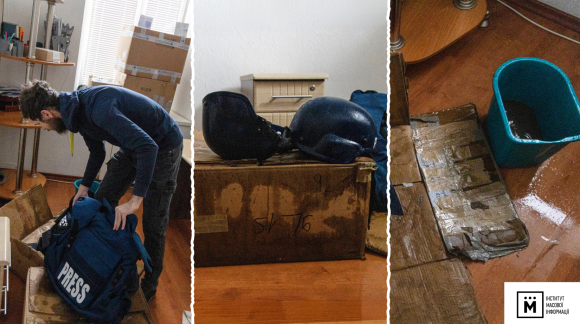The Verkhovna Rada Committee on Freedom of Speech is preparing suggestions for improving journalists’ access to the front line, the Committee’s chairman, Yaroslav Yurchyshyn, said at a briefing in the Verkhovna Rada on December 21, reports Detector Media.
“It is very good that our priorities are in sync with those of the President, who, as you know, has said that the authorities are preparing changes to journalists’ access to the front line. And our Committee plans – together with representatives from the UAF General Staff and the Ministry of Defense – to make sure that accreditation rules for accessing the front line are clearer. It is unlikely that getting accredited will be easier, given that we are at war. But at least there should be no place for arbitrary decisions where today we let them through and tomorrow we do not, some we do accredit in secret, but not others,” Yurchyshyn said.
In his opinion, there should be clear rules in this matter that the media can rely on. Because if the war is not covered in Ukrainian media, “both our society and international partners will be receiving the Russian perspective of events.”
“It is clear that talking about the war is not a priority for the military, they have one job – to fight, and we cannot force them to do as we want. But we try to explain to them that the drop of interest in Ukraine and the events related to Russian aggression is largely caused by the fact that we do not provide enough information to the West. And with all the problems that are on the rise in the US and in the European countries, the Ukrainian perspective of the war is critical. So we will try to find a proper level of interaction with the military through active communication,” said the chair of the Freedom of Speech Committee.
He added that communication teams of the UAF General Staff and the Ministry of Defense receive information on the journalists’ interactions with the military from two sources: complaints by media and reports by the military.
“According to the military reports, everything is well. Journalists are not dying, which means we do everything right, keeping them out of dangerous places, think the military. But there is an understanding at both the General Staff and the Defense Ministry that this format needs to be improved. And there are my suggestions that will be agreed with journalists before we commit them to paper. I think we will come to a shared understanding that we need to work with journalists more actively. There are nuances, however. The final decision will always be made by the commander of a military unit. And here it all depends on how well they understand the overall situation. Therefore, our task is to explain to our defenders that things like arms or ammunition supplies depend on how well journalists cover the situation on the front line. We will work with this, as well as with journalists’s escort – the press officers – to convince their superiors that productive communication with the media is necessary,” Yaroslav Yurchyshyn promised.
As the IMI reported, in November 2023 the Institute of Mass Information submitted the basic provisions regulating the accreditation-related cooperation between journalists and the military to the Ministry of Defense of Ukraine. The IMI also developed two more documents adding to the basic provisions regulating the accreditation-related cooperation between journalists and the military – amendments to Appendices 3 and 4 of Order No. 73 and practical advice developed together with the military – and submitted them to the Ministry of Defense.
This November, the Defense Ministry head of press and information, Illarion Pavliuk, said that journalists should be given more access to the combat zone without compromising the security of operations.
The chairman of the Verkhovna Rada Committee on Freedom of Speech, Yaroslav Yurchyshyn, outlined the three tasks he prioritises in his new position: releasing Ukrainian journalists from Russian captivity; ensuring more effective investigations into crimes against journalists; creating competitive and high-quality access to information for journalists.

